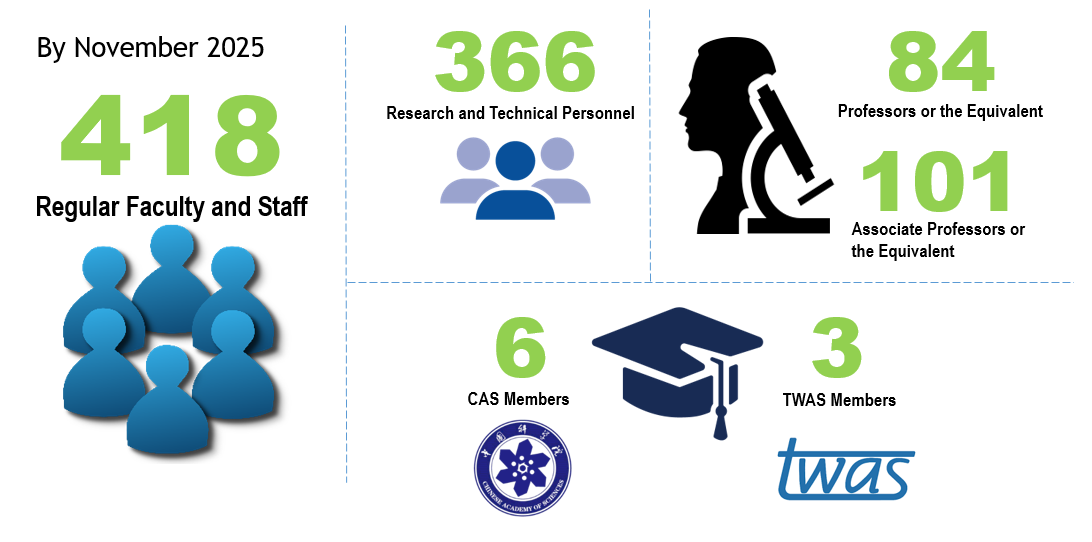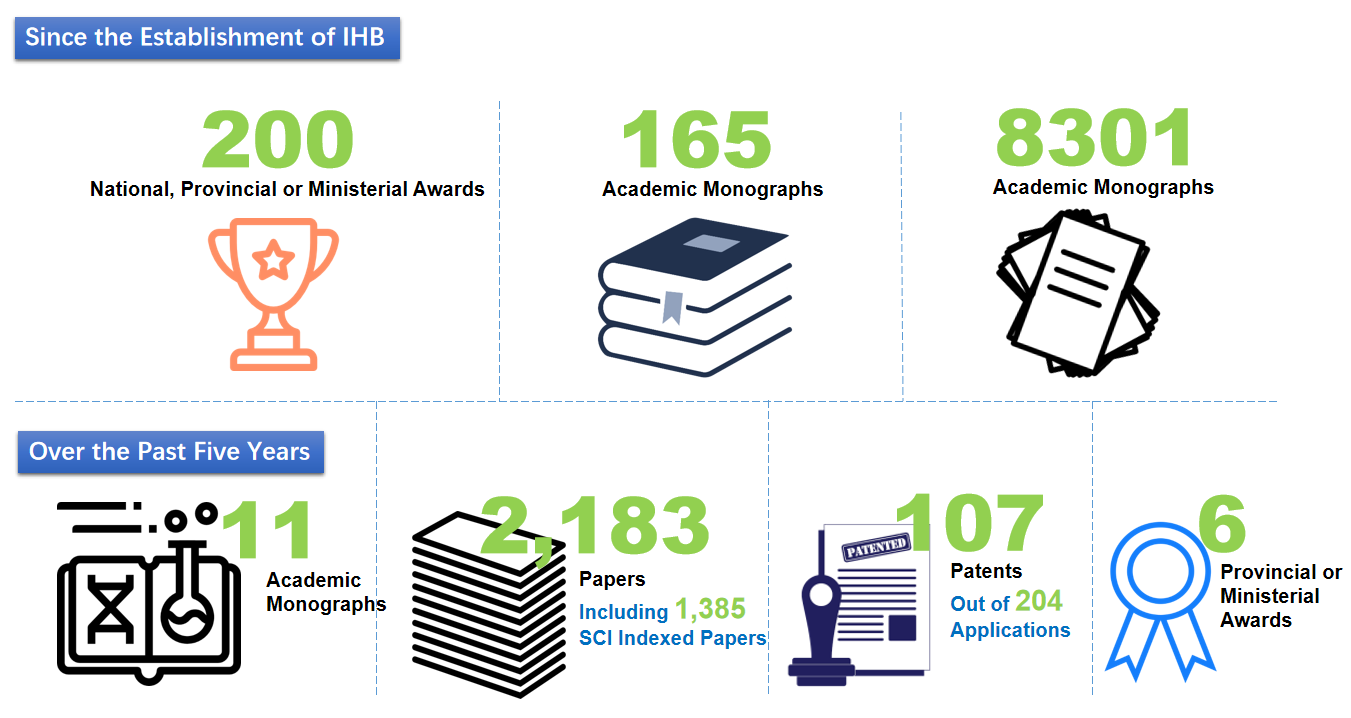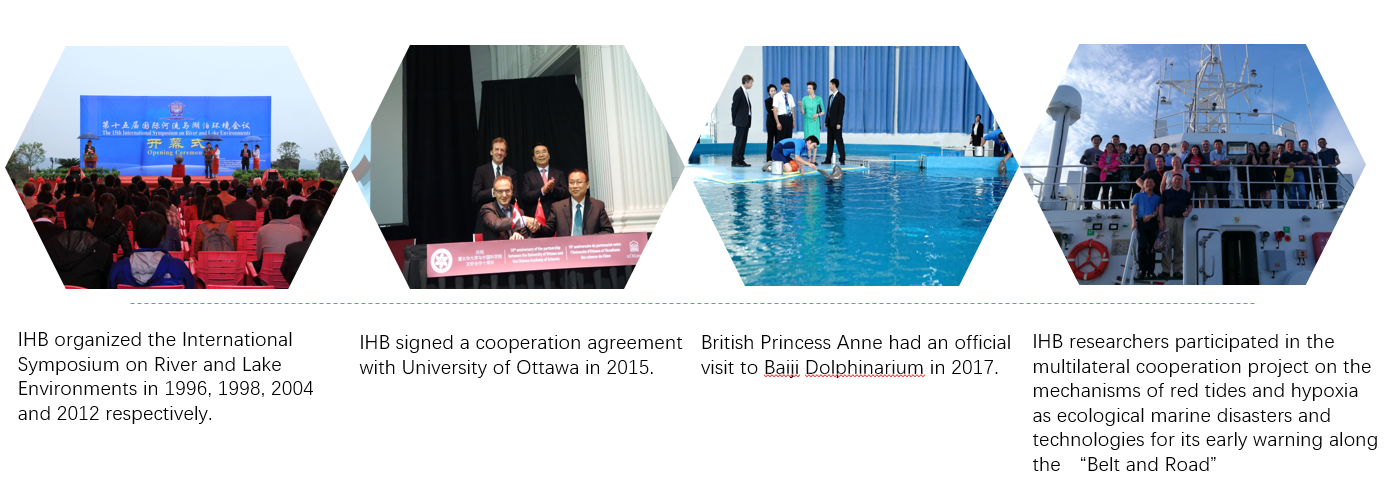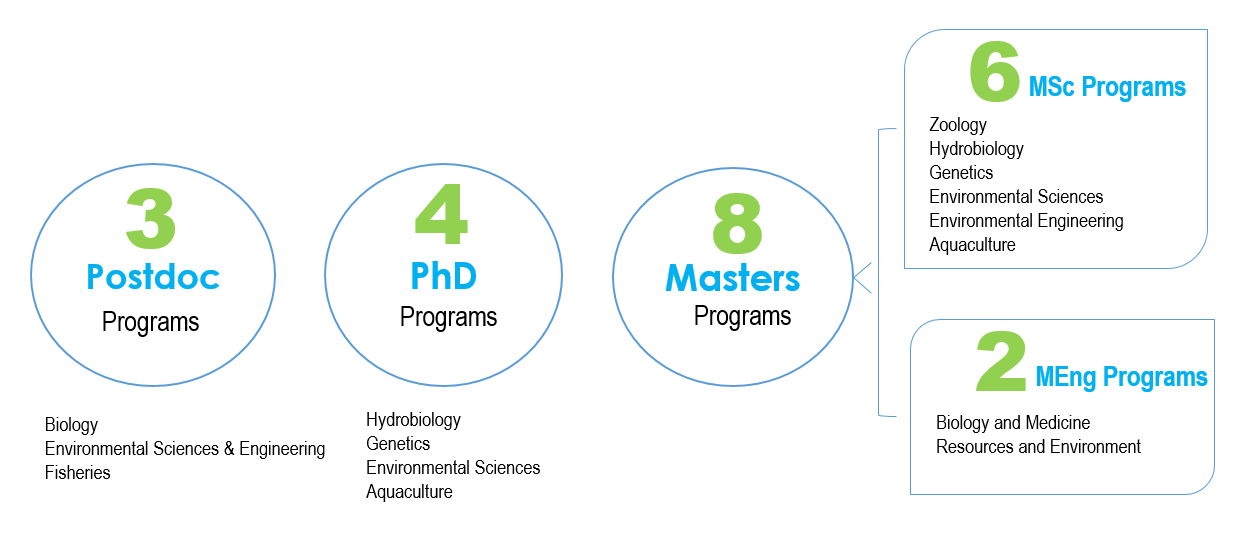
About


Organizational Structure
IHB is home to the Museum of Hydrobiological Sciences and the Freshwater Algae Culture Collection, which have the largest collection of freshwater fish and algae in Asia, and the Baiji Dolphinarium , which is the only aquarium in the world for the purpose of cetacean conservation and research, and Analysis and Testing Center, and the Hydrobiological Data Analysis Center.


In recent years, IHB scientists have been leading a series of national key S&T projects:
* National Science and Technology Major Project (e.g., Major S&T Program for Water Pollution Control and Treatment)
* National Key Research and Development Program (e.g., Blue Granary S&T Innovation Project, Synthetic Biology Project, Developmental Programming and Metabolic Regulation Project)
* National Natural Science Foundation of China Programs (e.g., Science Fund for Creative Research Groups, Distinguished Young Scholars Fund, Excellent Young Scientists Fund, Major Research Plan and Key Program)
* CAS Strategic Priority Research Program and other important research programs supported by local governments and large and medium-sized enterprises
A sequence of research achievements, with significant breakthrough in theories and promising prospect in application, have been achieved to support the protection of water environment, and sustainable development of freshwater fisheries. These achievements have addressed a series of cutting-edge scientific issues in fish molecular systematics and evolution, algal biology, fish genetic breeding, freshwater ecology, water environmental engineering, and conservation biology, meeting the state’s strategic demand and have produced great socio-economic and environmental benefits with extensive impact on society.
The IHB emphasizes playing the role of the national team in aquatic biology science and technology, actively promoting local scientific and technological endeavors, participating in local economic construction, and achieving a series of accomplishments. Relying on the National Research Center for Freshwater Fisheries Engineering (Wuhan) and the Crucian Carp Genetics and Breeding Center, Ministry of Agriculture and Rural Affairs, it has promoted the transformation of achievements in fisheries models and environmentally friendly feed, guiding the construction of a large number of national and provincial aquatic original and good breeding farms. Relying on the Hubei Province and Wuhan City Water Environmental Engineering Technology Research Center, it has promoted the radiation and transformation of a batch of core technologies in water environmental management to the whole country. The high-yield and high-quality new variety of bream "Zhongkejiayong No. 1" bred by the institute and the cooperative breeding of the all-female mandarin fish new variety "Wunong No. 1" and the all-male hybrid catfish "Xiongli No. 1" have all been certified as new aquatic varieties by the National Aquatic Original and Good Breed Approval Committee in 2022.
International Cooperation and Exchanges
IHB has fostered extensive global engagement over the past decade, with its researchers undertaking over 800 academic visits to more than 30 countries and regions for collaborative projects, advanced training, and short-term visits. The institute has also hosted more than 2,200 international experts from nearly 40 countries and regions for academic exchanges and joint research. As a core member, IHB participated in several international cooperative research projects, such as the U.S. National Science Foundation’s Assembling the Tree of Life project, which aims to reconstruct the evolutionary origin of all living things. The institute also successfully organized the International Symposium on River and Lake Environments in 1996, 1998, 2004, 2012, and 2024. In 2025, it hosted the Ciliate Molecular Biology Meeting, marking the first time this prestigious meeting was held outside Europe or North America. IHB has actively initiated and led international multilateral collaborations, including joint investigations of freshwater cetaceans and the multilateral cooperation project on the mechanisms of red tides and hypoxia as ecological marine disasters and technologies for its early warning along the “Belt and Road”. Additionally, it successfully conducted the CAS Science & Technology Training Program for Belt and Road Initiative and Developing Countries – 2024 International Workshop on Monitoring and Control of Harmful Algal Blooms, significantly enhancing personnel exchanges and scientific cooperation among BRI partner nations, particularly in Southeast Asia, in the field of harmful algal bloom research.
From November 5th to 13th, 2022, the 14th Conference of the Parties (COP14) to the Ramsar Convention on Wetlands opened in Wuhan, China. During the conference, the theme event of the COP14 host country series activities, "Building a Lifelong Yangtze River and Inheriting the Civilization of Great Rivers," hosted by the Wuhan Municipal Bureau of Parks and Forestry and co-organized by the IHB, was held on the November 8th. As the largest side event of COP14, experts attending the meeting jointly exchanged and discussed the research and protection progress of the Yangtze River Conservation, shared experiences and practices, and told the Chinese story of protecting aquatic biological resources in international river basins. The meeting also released the "Proposal for National Participation in the Protection of the Yangtze River," led by Cao Wenxuan, the initiator of the "Ten-Year Fishing Ban" in the Yangtze River and an academician of the Chinese Academy of Sciences.

Graduate Education
IHB is one of the first institutions authorizzed by the Academic Degrees Committee of the State Council to offer PhD degree programs and master degreee programs. It is qualified to enroll and train students from both home and abroad. By November 2025, IHB has mentored 599 graduate students (298 master's students, 301 doctoral students) and 112 posdoctoral fellows.

Periodicals
The "Acta Hydrobiologica Sinica," hosted by IHB, is indexed in several databases, including the China Science Citation Database (CSCD), and the China Science and Technology Papers Statistics Source Core Journals. It has consistently been recognized as a premium Chinese scientific journal and an excellent journal in Hubei Province, and was rated as a Q1 journal in the "China Academic Journal Impact Factor Annual Report." In 2022, the journal shifted from a bimonthly to a monthly publication and introduced special columns such as "Ten-Year Fishing Ban" and "Constructed Wetlands."
"Water Biology and Security" was launched as a quarterly journal, which is indexed in databases like DOAJ and Scopus. This new journal was also selected as a high-level new publication project under the 2022 China Science and Technology Journal Excellence Action Plan.